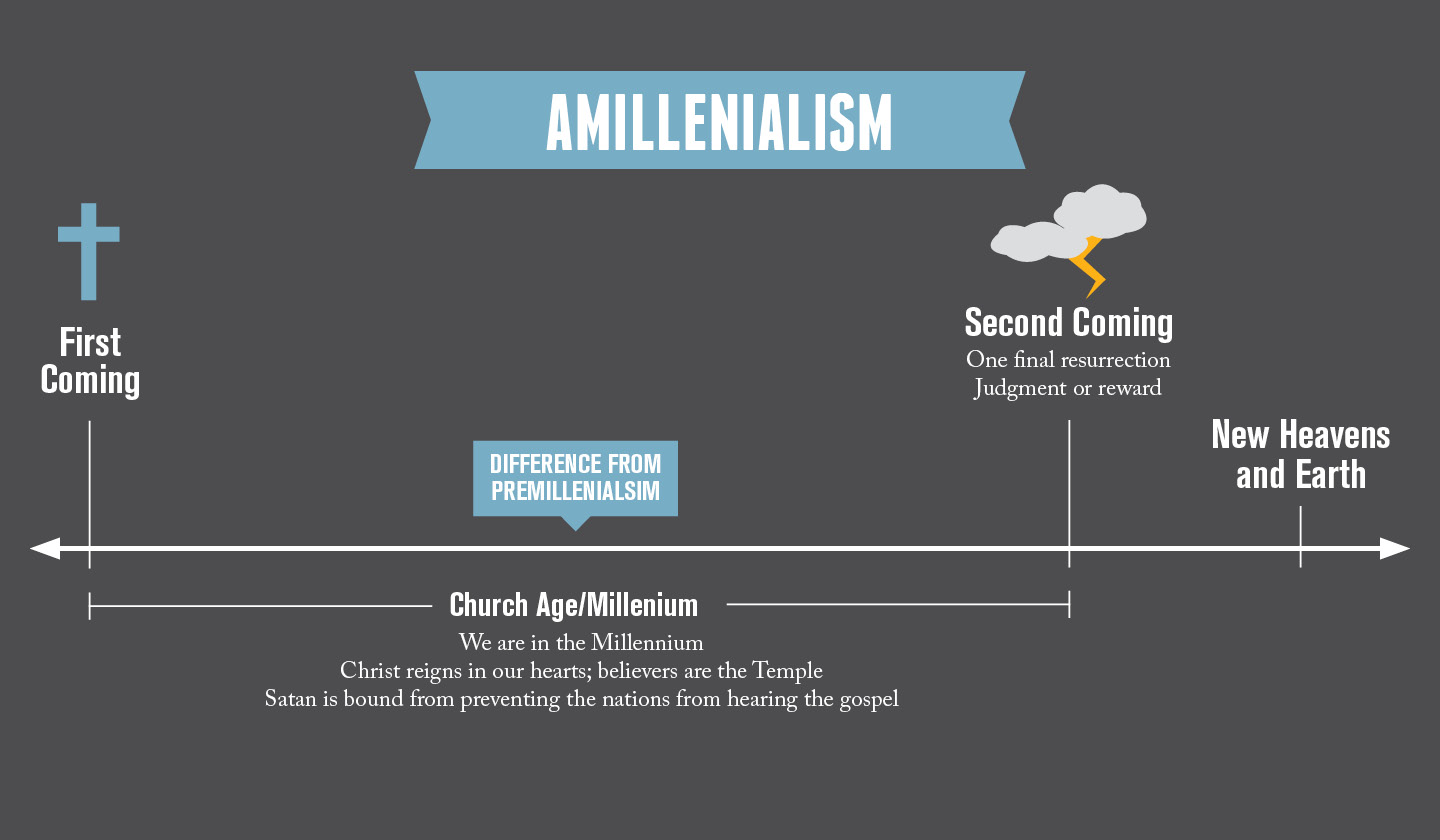Benware, Paul N. Understanding End Times Prophecy: a Comprehensive Approach. Chicago: Moody, 2006. 121.


The term amillennial literally means “no millennium.” This is really a misnomer, however, because amillennialists do believe in a millennium—just a symbolic one. Under this view, Jesus reigns in heaven over glorified believers (as well as in the hearts of earthly believers). According to amillennials, prophecies about the kingdom either refer to (1) Jesus ruling in heaven on a heavenly throne, or (2) Jesus ruling in the hearts of believers on Earth. In either sense, these OT prophecies about the kingdom of God are spiritualized. While God made unconditional promises to Israel, amillennials argue that the Jewish nation abandoned the Messiah. Once you kill the son of God, they argue, the promises become forfeited. While God married Israel, they argue that by killing the Messiah, God wrote Israel a certificate of divorce (Isa. 50:1; Jer. 3:8). We might define this view by the comparison to the others.
Millennial Views | ||||
VIEW | Premillennial | Amillennial | Postmillennial | Historical Premillennial |
The Millennium | A literal 1,000 year period | A figurative number | A figurative number | A literal 1,000 year period |
Christ’s reign | Reigns literally in a kingdom on Earth after his Second Coming | Reigns spiritually on a heavenly throne or reigns spiritually in the hearts of believers | Reigns spiritually in the hearts of believers, as the gospel transforms the nations of the Earth | Reigns literally in a kingdom on Earth after his Second Coming |
Israel | Christ reigns in Israel over a regathered Israel | The Church replaces the promises given to national Israel | The Church replaces the promises given to national Israel | The Church replaces the promises given to national Israel |
View of Human History | Believes human history will get progressively worse, as the gospel reaches all nations | Believes human history will get progressively worse, as the gospel reaches all nations | Believes that human history will get progressively better. The nations will eventually be transformed by Christ’s reign in society | Believes human history will get progressively worse, as the gospel reaches all nations |
The amillennial view is the majority view in Christianity today. Premillennialist Paul Benware admits, “If all Christendom could be gathered together and a vote taken on which of the three millennial views was favored, amillennialism would easily win. Amillennialism is clearly the majority view.” However, we don’t believe we should take our theology from majority opinion.
 Biblical Passages that Support Amillennialism
Biblical Passages that Support Amillennialism
Theologians have noted that amillennialism is largely a negative perspective. Instead of offering a positive picture of the end times, amillennials typically just criticize the literalism of premillennialism. Walvoord writes,
The current millennial debate is singular for its negative quality. While premillennialism has had poor handling by many of its own adherents, it has at least aimed at being constructive, offering a definite system of interpretation and providing a positive voice. While amillennialism has attracted many scholars and has produced many works on the millennial issue in the last two decades, for the most part their approach has been one of ridicule and attack on premillennialism rather than an ordered presentation of their own system of beliefs. This direction of published studies has been born of the nature of the amillennial theory—a denial of the millennium. Amillennialists have also rightly argued that if they successfully disposed of their opponents who were premillennial they would have no effective opposition to their own viewpoint. The negative attitude was also one of necessity, as amillennialists are by no means agreed on the essentials of their own system of eschatology and millenarianism.
This being the case, the amillennial typically doesn’t know how to interpret vast portions of OT prophecy for the future. We feel that struggling with this difficult picture of the future is better than simply spiritualizing it. Amillennials typically take their “Church brush” and paint ever OT prophecy as referring to the Church in some fashion.
This being the case, amillennials often offer a number of passages that seem to contradict premillennial theology:
(Lk. 17:20-21) Doesn’t Jesus teach that the kingdom was “spiritually” fulfilled in our hearts?
(Acts 2:16-21) Does Peter misquote Joel 2:28-32?
(Rom. 4:9-12) Is Paul teaching that the Church has fulfilled the Abrahamic covenant?
(Heb. 8:13) Is the author of Hebrews claiming that the Church fulfilled this promise to Israel?
(Rev. 20:2-3) Is Satan currently bound?
(Rev. 20:4-5) Does the “first resurrection” refer to spiritual regeneration or bodily resurrection?
(Rev. 20:7-8) Do Gog and Magog rebel before the millennium or after?
Beale, G. K. The Book of Revelation: A Commentary on the Greek Text. Grand Rapids, MI: W.B. Eerdmans, 1999.
Morris, Leon. The Revelation of St. John: An Introduction and Commentary. Grand Rapids, MI: William B. Eerdmans Pub., 1969.
Strimples, Robert. “Amillennialism.” Bock, Darrell (General Editor). Three Views on the Millennium and Beyond. Grand Rapids, MI. Zondervan. 1999.

James earned a Master’s degree in Theological Studies from Trinity Evangelical Divinity School, graduating magna cum laude. He is the founder of Evidence Unseen and the author of several books. James enjoys serving as a pastor at Dwell Community Church in Columbus, Ohio, where he lives with his wife and their two sons.
